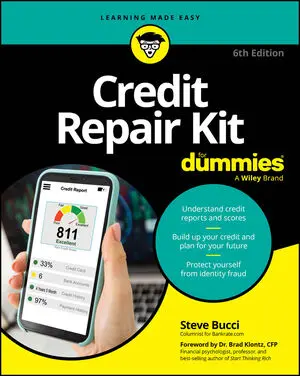Articles & Books From Loans & Credit
Improve your credit score and rebuild your financial future Interested in getting a credit makeover? You're not alone. The overall amount of Americans' outstanding credit card and revolving debt continues to rise, powered by the increasing availability of lending options and an increasingly challenging financial environment.
Cheat Sheet / Updated 04-12-2024
Everyone hates having debt, but most people can’t feasibly make a big purchase or handle a crisis without taking on some kind of debt, like student loans, auto loans, and credit cards. Debt happens to everyone at some point. However, that doesn’t mean you can’t do anything about it. Here you find some tips to start getting out of debt.
Article / Updated 08-07-2023
Before you get a mortgage, be sure you understand your personal financial situation. The amount of money a banker is willing to lend you isn't necessarily the amount you can "afford" to borrow given your financial goals and current situation. Maximize your chances for getting the mortgage you want the first time you apply by understanding how lenders evaluate your creditworthiness.
Article / Updated 07-05-2023
Once you’ve determined the income for your spending plan, you need to calculate what’s going out — and where it’s going. Determining your monthly spending isn’t difficult, but for some people it requires a little digging.Many of your major expenses — mortgage or rent, credit card bills, utilities, car loans, and so on — hit monthly.
Article / Updated 06-28-2023
The world of credit can be complex, unforgiving, and very expensive! Consumers need effective protection. The result is a series of laws, protections, and agencies whose purpose is to keep the credit game honest and give consumers a fair opportunity. The Fair Debt Collection Practices Act The Fair Debt Collection Practices Act (FDCPA) limits debt collectors’ activities and spells out your rights.
Article / Updated 05-03-2023
The federal Truth in Lending Act makes it easy to compare credit card offers, because it requires credit card companies to provide written information about the credit card terms. Do a comparison of credit cards fees, rates, APRs, and balance calculation methods before you accept even a preapproved credit card.
Article / Updated 04-17-2023
It has been said that a person can’t be too good-looking or have too many friends. This has never been truer than in the world of credit — at least the part about friends.The world of credit can be complex, unforgiving, and very expensive! The credit-granting, credit-reporting, and credit-scoring industries have become increasingly complex and powerful to the point where they are used for everything from issuing credit cards to getting jobs.
Article / Updated 04-14-2023
Because a lot of your credit score is based on using credit and making payments on time, it’s a good idea to use small purchases to get back into good standing quickly. Why does making small purchases work so well? Because each item costs less, more purchases are reported to the credit bureaus faster. If it costs more than $10, charge it (but pay it off each month!
Article / Updated 08-16-2022
Credit impacts two major and basic consumer credit instruments that most people need when they get started on life’s journey: credit cards and loans. You may think that you know how these instruments work, but things have changed because of regulations like the CARD Act and the financial meltdown that threatened banks with failure due in large part to lax underwriting standards.
Article / Updated 05-12-2022
If you talk with others or read articles or books about prepaying your mortgage, you’ll come across those who think that paying off your mortgage early is the world’s greatest money-saving device. You’ll also find that some people consider it the most colossal mistake a mortgage holder can make. The reality is often somewhere between these two extremes.



